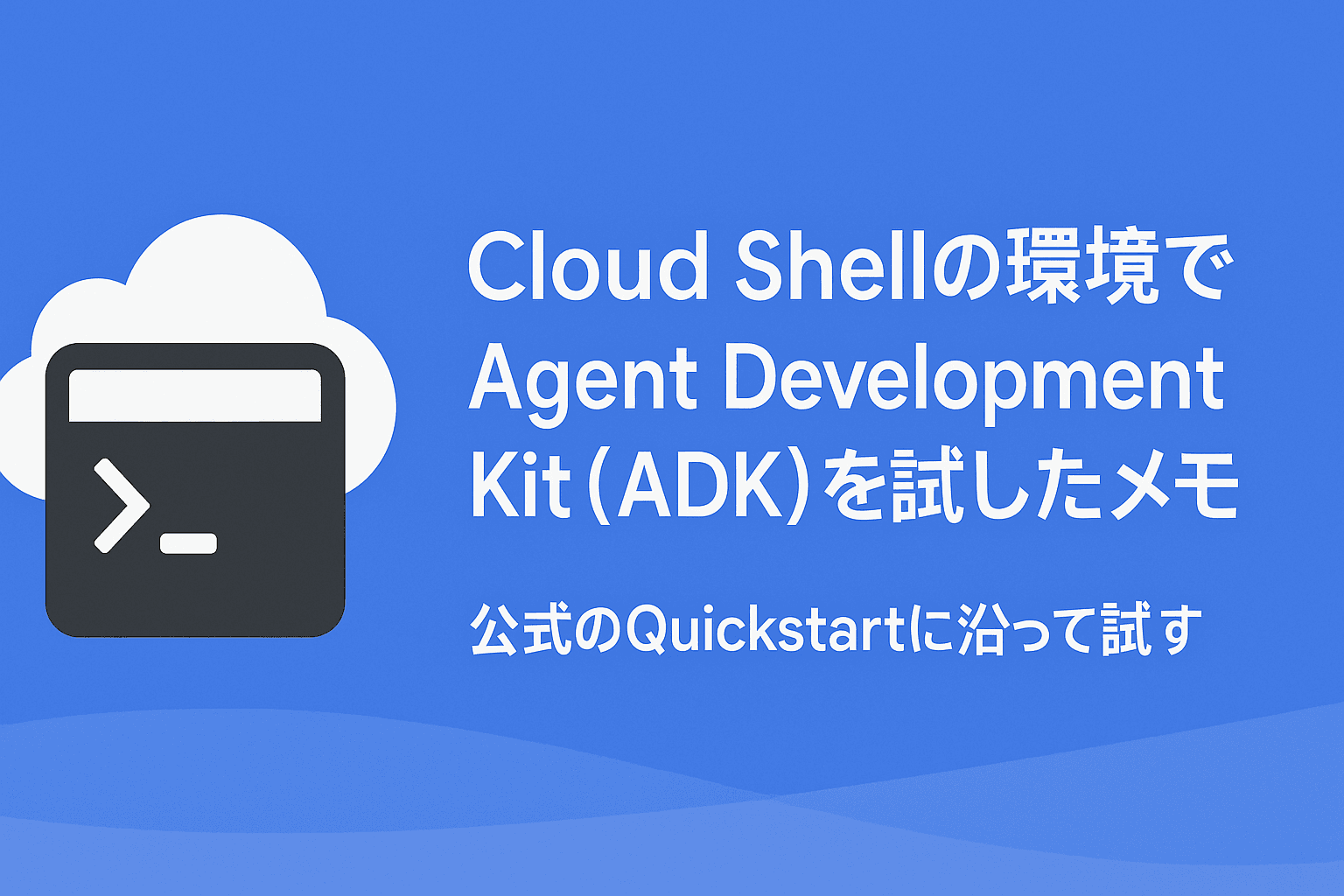
Agent Development Kit(ADK)を試す
2025年04月23日
ADKGemini
cloud shellの環境でAgent Development Kit(ADK)を試したメモ 公式のQuickstartに沿って試す
https://google.github.io/adk-docs/get-started/quickstart/
環境のセットアップ
python -m venv .venv
source .venv/bin/activate
pip install google-adk
プロジェクトの作成
以下のようなプロジェクト構成を作る必要があるらしい
parent_folder/
multi_tool_agent/
__init__.py
agent.py
.env
multi_tool_agent ディレクトリの作成
mkdir multi_tool_agent/
init.py の作成
echo "from . import agent" > multi_tool_agent/__init__.py
agent.py の作成
まずファイルを作成する
touch multi_tool_agent/agent.py
ファイルの内容を以下で置き換える
import datetime
from zoneinfo import ZoneInfo
from google.adk.agents import Agent
def get_weather(city: str) -> dict:
"""Retrieves the current weather report for a specified city.
Args:
city (str): The name of the city for which to retrieve the weather report.
Returns:
dict: status and result or error msg.
"""
if city.lower() == "new york":
return {
"status": "success",
"report": (
"The weather in New York is sunny with a temperature of 25 degrees"
" Celsius (41 degrees Fahrenheit)."
),
}
else:
return {
"status": "error",
"error_message": f"Weather information for '{city}' is not available.",
}
def get_current_time(city: str) -> dict:
"""Returns the current time in a specified city.
Args:
city (str): The name of the city for which to retrieve the current time.
Returns:
dict: status and result or error msg.
"""
if city.lower() == "new york":
tz_identifier = "America/New_York"
else:
return {
"status": "error",
"error_message": (
f"Sorry, I don't have timezone information for {city}."
),
}
tz = ZoneInfo(tz_identifier)
now = datetime.datetime.now(tz)
report = (
f'The current time in {city} is {now.strftime("%Y-%m-%d %H:%M:%S %Z%z")}'
)
return {"status": "success", "report": report}
root_agent = Agent(
name="weather_time_agent",
model="gemini-2.0-flash",
description=(
"Agent to answer questions about the time and weather in a city."
),
instruction=(
"You are a helpful agent who can answer user questions about the time and weather in a city."
),
tools=[get_weather, get_current_time],
)
.env の作成
.envファイルを作成する
touch multi_tool_agent/.env
以下の内容に書き換える(今回はGemini APIを使うので、GOOGLE_API_KEYのみ上書きする )
# If using Gemini via Google AI Studio
GOOGLE_GENAI_USE_VERTEXAI="False"
GOOGLE_API_KEY="paste-your-actual-key-here"
# # If using Gemini via Vertex AI on Google CLoud
# GOOGLE_CLOUD_PROJECT="your-project-id"
# GOOGLE_CLOUD_LOCATION="your-location" #e.g. us-central1
# GOOGLE_GENAI_USE_VERTEXAI="True"
エージェントを実行するためのUIにアクセスする
プロジェクトのルートディレクトリに移動する
parent_folder/ <-- navigate to this directory
multi_tool_agent/
__init__.py
agent.py
.env
以下を実行する
adk web
以下のような画面が出てきて、ローカルホストの8000でplay groundが起動する
INFO: Started server process [1927]
INFO: Waiting for application startup.
+-----------------------------------------------------------------------------+
| ADK Web Server started |
| |
| For local testing, access at http://localhost:8000. |
+-----------------------------------------------------------------------------+
INFO: Application startup complete.
INFO: Uvicorn running on http://0.0.0.0:8000 (Press CTRL+C to quit)
ローカルホストにアクセスし、左上のドロップダウンからmulti_tool_agentを選択し以下のように会話できます。

BigQuery MCPを使ったエージェントも作ってみる
.envに情報追加
以下の情報もenvに追加する
# Google Cloud Info
PROJECT_ID="" # プロジェクトID
LOCATION="" # データセットのロケーション
KEY_PATH="" # JsonキーのPath
サービスアカウントは以下のロールが必要となる
- roles/bigquery.user (recommended)
- OR both:
- roles/bigquery.dataViewer
- roles/bigquery.jobUser
agent.pyの実装
以下の感じでMCP使ったエージェント機能を実装する
MCPはこちらを使用する。 公式ではないものの、GoogleCloudのパートナーのOREDATAという企業がスポンサーのようなので、一旦信用して使用する。
デフォルトは1GBの検索上限になっているようなので、プロンプトの中でmaximumBytesBilled を指定してあげることで上限増やすことができる
# Add nest_asyncio to allow running asyncio.run within an existing event loop
import nest_asyncio
nest_asyncio.apply()
import os
import asyncio
from dotenv import load_dotenv
from google.genai import types
from google.adk.agents import Agent
from google.adk.agents.llm_agent import LlmAgent
from google.adk.tools.mcp_tool.mcp_toolset import MCPToolset, SseServerParams, StdioServerParameters
load_dotenv('.env')
# --- Helper function to initialize agent asynchronously ---
async def _initialize_agent():
"""Asynchronously fetches MCP tools and initializes the LlmAgent."""
print("Attempting to connect to MCP BigQuery server and fetch tools...")
# Load connection details from environment variables
PROJECT_ID = os.getenv("PROJECT_ID")
LOCATION = os.getenv("LOCATION")
KEY_PATH = os.getenv("KEY_PATH")
# Validate required environment variables
if not PROJECT_ID:
raise ValueError("Environment variable PROJECT_ID is not set.")
if not LOCATION:
raise ValueError("Environment variable LOCATION is not set.")
if not KEY_PATH:
raise ValueError("Environment variable KEY_PATH is not set.")
if not os.path.exists(KEY_PATH):
raise FileNotFoundError(f"Key file not found at path: {KEY_PATH}")
tools, exit_stack = await MCPToolset.from_server(
connection_params=StdioServerParameters(
command='npx',
args=[
"-y",
"@ergut/mcp-bigquery-server",
"--project-id",
PROJECT_ID,
"--location",
LOCATION,
"--key-file",
KEY_PATH],
)
)
print(f"MCP Toolset created successfully. Fetched {len(tools)} tools.")
agent = LlmAgent(
model='gemini-2.5-pro-exp-03-25', # Adjust model name if needed
name='BigQuery_agent',
instruction='''You are a helpful agent who can answer user questions about data in BigQuery.
Always check the table definition first.
If a syntax error occurs, check the error, correct the SQL, and execute again.
your SQL maximumBytesBilled is 10000000000.
Please speak japanese.
''',
tools=tools,
)
print("Agent initialized.")
# Return both agent and exit_stack so cleanup can potentially be handled
return agent, exit_stack
# --- Top-level Agent Initialization ---
print("Initializing agent at module level...")
try:
# Run the async initialization function synchronously at the top level using nest_asyncio compatibility
root_agent, mcp_exit_stack = asyncio.run(_initialize_agent())
print("Agent initialization complete. 'root_agent' is now defined.")
# NOTE on Cleanup:
# The 'mcp_exit_stack' holds the context manager for cleaning up the MCP server connection.
# In a typical script using 'async with', this would be handled automatically.
# When run via ADK CLI, it's unclear if/how this cleanup is triggered.
# If the MCP server process doesn't terminate after the CLI command finishes,
# explicit cleanup logic might be needed.
except Exception as e:
print(f"Error during agent initialization: {e}")
# Raise the exception to prevent the module from loading incorrectly
raise
# --- Remove old async_main and related code ---
# The ADK CLI framework will handle running the agent.